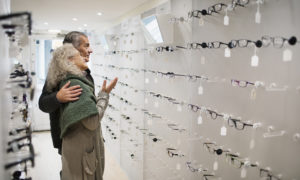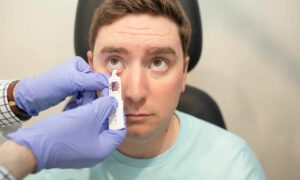By Feyi Aworunse, OD, FAAO

Jan. 18, 2023
Breaking bad news to patients requires empathy, patience and professionalism. Although it can be an uncomfortable experience for both patient and provider, there are many effective ways to communicate bad news.
Bad news can be defined as information that is perceived as negatively impacting one’s lifestyle or view of the future. That said, bad news is relative to the individual on the receiving end and can range from being a seemingly minor inconvenience to life-altering.
Here are a few pieces of bad news ODs often have to break to patients, along with the communication approaches that have worked best for my patients. These approaches enable me to demonstrate empathy while helping patients to understand the next steps of their treatment plan.
Diagnosing a Vision-Threatening Eye Disease (diabetic retinopathy, macular degeneration, glaucoma, etc.)
Terms like glaucoma, diabetic retinopathy and macular degeneration can make the average patient feel uncomfortable. Medical jargon can be intimidating and may cause a patient to be confused, anxious or fearful of what they are hearing. The primary fear is that they’ll go blind.
Typical patient reactions and questions/comments for the doctor?
- How did this happen? Was there something I could have done to prevent this?
- Is this something that will get worse? Is there a cure for this? Is there anything we can do to make it better?
Best way for OD to respond?
- Be clear and direct with the patient. Inform the patient of the nature of the disease, especially for those that have no cure or could result in irreversible vision loss.
- Emphasize how they can manage their condition, the options for treatment or suggestions for lifestyle changes that may delay progression and allow the patient to maintain their level of vision.
- It’s important that the doctor offers reassurance to the patient. Take a moment to address any lingering questions or concerns. Emphasize the benefit of adhering to the proposed management plan or referral. Provide additional patient education through handouts or videos and make yourself available to answer additional questions beyond the current visit.
Permanent Vision Loss
Irreversible vision loss of any degree can be devastating news for a patient. There is a well-documented fear of blindness, as many people consider sight their most important sense. This news is hard for those who experience sudden vision loss or gradual loss due to progressive disease.
Typical patient reactions and questions/comments for the doctor?
- This type of news can be difficult for the patient to accept and can trigger an emotional response. Patients may express shock, anger, sadness and fear.
- There also can be guilt felt by the patient, that if they just went to the doctor sooner or took better care of themselves, they would have avoided a bad outcome.
Best way for OD to respond?
- Affirm the feelings of your patient. If a patient begins crying, pause, be empathetic and allow them time to collect themselves.
- Reassure the patient that, despite a life-changing diagnosis, there are resources that they may benefit from to help them adjust to their new way of life.
- Affirm that their feelings of fear, anger, sadness, etc., are valid, but point out that there are resources available to help them navigate through these changes. Provide a handout or website references for local resources that the patient may benefit from.
I had a young man who presented to me for a third opinion of a diagnosis he had received. He had irreversible vision loss in both eyes, with the ability to see only a moving hand a few feet away from him for the past two years. He had been evaluated before and was told he had “damage to his optic nerves.” Unfortunately, his vision was compromised due to methanol toxicity, which I explained to him.
Although I wasn’t giving him new information about his condition, he had an emotional response to the fact that his vision loss was likely permanent. He expressed guilt for his potential role in this outcome and concern for his ability to provide for his family. He shared that he was grateful that I took the time to inform him about his diagnosis in a way that made sense to him because previous providers did not tell him more than “there’s nothing I can do for you.”
I provided him with local resources for those with low vision and brought his wife in to discuss my findings, resources and ways to support him. This encounter affirmed the necessity of empathy, patience and instilling hope when sharing life-altering news with our patients.
Need for Surgery/Corrective Lenses
Despite this news offering a solution to improve one’s vision, it can be initially be received as negative news, especially if it is unexpected or not desired.
Other Articles to Explore
Typically patient reactions and questions/comments for the doctor?
- Do I have to have surgery (or wear glasses)?
- What happens if I don’t wear glasses or have surgery?
- Some people worry that they are going blind if they need glasses or that wearing glasses will make things worse.
- Some patients may be concerned with how they’ll look or be perceived when wearing glasses.
Best way for OD to respond?
- Inform the patient that what you’re presenting is a recommendation if their desire is to improve their vision.
- Reassure them that diagnoses such as cataracts or refractive error are common.
- Educate patients about their refractive error, link it to their initial vision complaint, emphasizing that this is a positive solution. If the patient is adamant about not wanting to wear glasses full- or part-time, a discussion about contact lenses may be considered.
- Ask the patient what concerns them about the solutions that have been offered. Sometimes you can uncover that the patient fears having surgery due to hearing about a negative outcome, or they live alone and don’t know who’s going to help them after surgery, or they are concerned about the associated costs.
- Reassure the patient that these are normal and expected findings. Present relevant options for correction/treatment and encourage them to make the best decision for their lifestyle.
 Feyi Aworunse, OD, FAAO, practices at the Eye Clinic at Nashville General Hospital at Meharry. To contact her: feyi.aworunse@gmail.com
Feyi Aworunse, OD, FAAO, practices at the Eye Clinic at Nashville General Hospital at Meharry. To contact her: feyi.aworunse@gmail.com

























